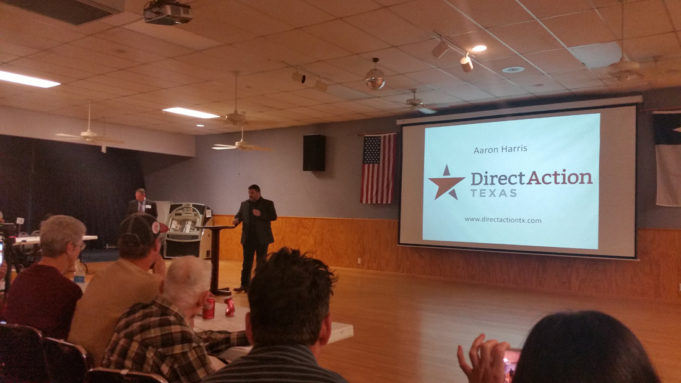Extra seats had to be brought in to accommodate the crowd of more than 250 who showed up on Monday at a Fort Worth Elks Lodge to discuss suspicions of voter fraud in Tarrant County. Among the allegations made at the meeting: Two elected officials –– Fort Worth City Councilmember Sal Espino and State Rep. Ramon Romero of Fort Worth –– benefited from voter fraud. Longtime incumbent Espino was reelected to another two-year term in 2015. Romero was elected state representative in 2014 and is completing his first two-year term.
A local political advocacy group says it has uncovered enough fraudulent ballots to prove that Espino’s defeat of Steve Thornton in May 2015 by 26 votes was not legitimate, and Romero’s unseating of longtime Democratic incumbent Lon Burnam in March 2014 wouldn’t have been possible without the use of voter fraud.
Several public officials, including District Attorney Sharen Wilson and Tax Assessor/Collector Ron Wright, went to hear the presentation by Aaron Harris, executive director of Direct Action Texas, a political advocacy group based in North Texas that pushes for government transparency. The right-leaning group’s Facebook page promised to “name elected officials” who benefited from voter manipulation.
Over the next hour, Harris described the scope of the voter fraud operation, which is now under investigation by the incredibly litigious state attorney general’s office. Vote “harvesting,” he said, involves manipulation of Texas applications for ballot by mail, or ABBM, forms. In Texas, voters who are disabled, out of the county on election day, incarcerated, or 65 years or older are eligible to use the mailed-in forms.
Aaron said the scheme works like this: Harvesters (part-time workers hired by political organizers) apply for ABBM forms on behalf of senior citizens without the elderly voters’ knowledge. When the sealed ballots arrive by mail, the harvesters pull the forms from the voter’s mailbox and then pose as community activists who are volunteering to help individuals fill out the documents. If the harvesters are unsuccessful in getting the resident to vote for a specific political candidate, then the ballot is disposed of and never counted.
Romero sounded skeptical in a phone interview with us this week.
Were vote harvesters “literally following the mailman, waiting for him to show up?” Romero said. “That sounds impossible. This isn’t a matter of saving the people of Texas. This is a matter of trying to take votes away from the elderly, specifically Latinos who have begun to vote in greater and greater numbers. I encourage people to vote by any form possible.”
Espino said the allegations are purely political and target minorities.
“All my workers were trained and instructed to follow the law,” Espino said in a phone interview. “We had experienced folks working with seniors. It’s unfortunate in this era of hyper-partisan elections that folks that lose elections choose to cast aspersions on the entire electoral system. These allegations are being made before the attorney general has finished his investigation. You have to question the timing.”
Harris said he is not suggesting that Espino or Romero were directly involved in vote harvesting, but he claims that both politicians benefited from the practice. In the coming weeks, Harris said he will release additional names of local public officials and political consultants who are actively engaged in defrauding registered voters and, ultimately, the entire democratic process.
“These people are bold and pretty good at what they do because no one is looking,” Harris said.












